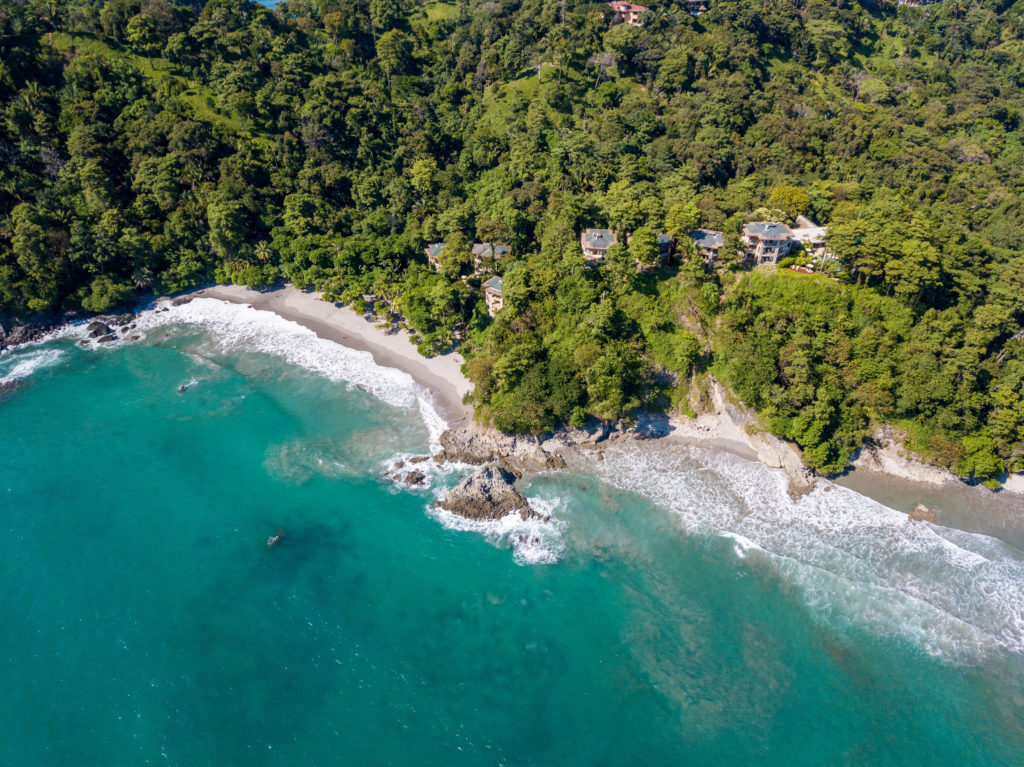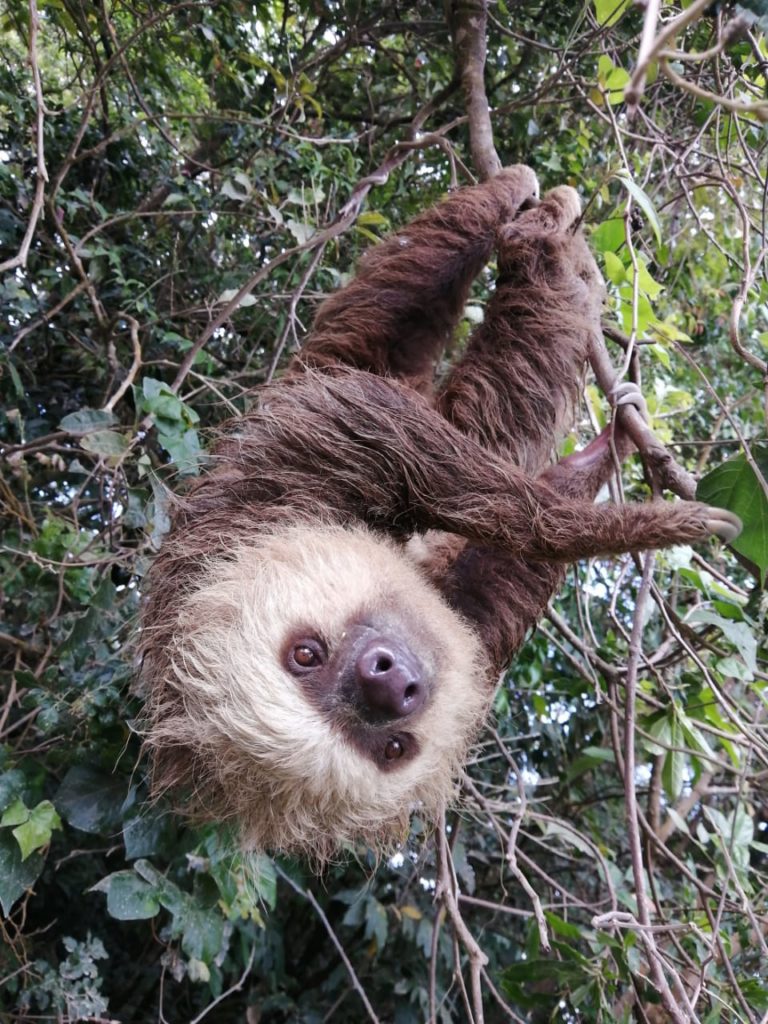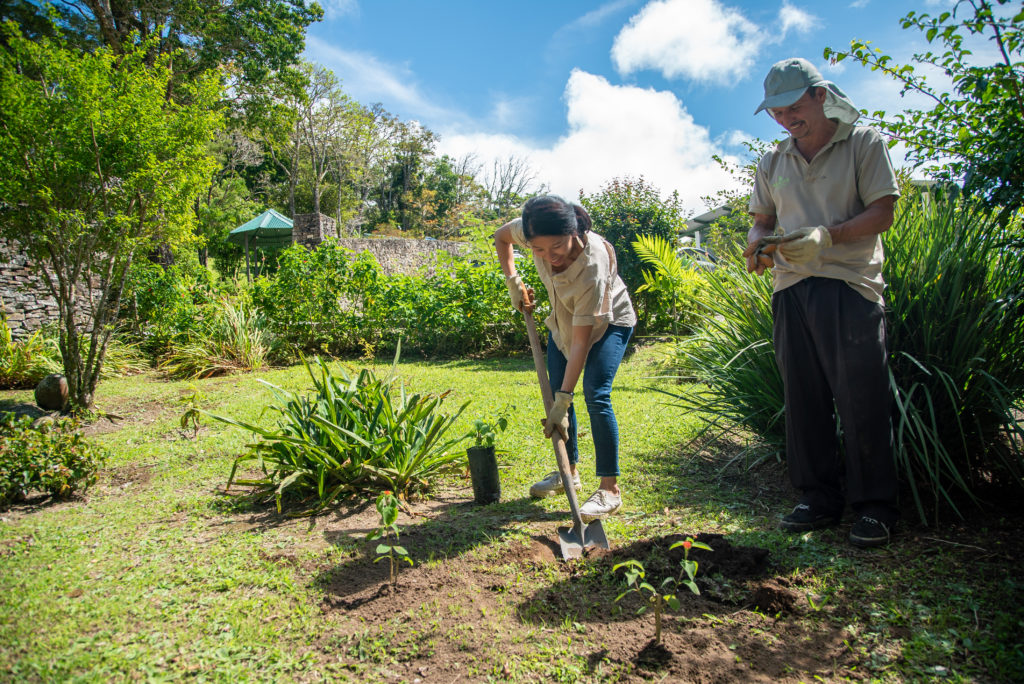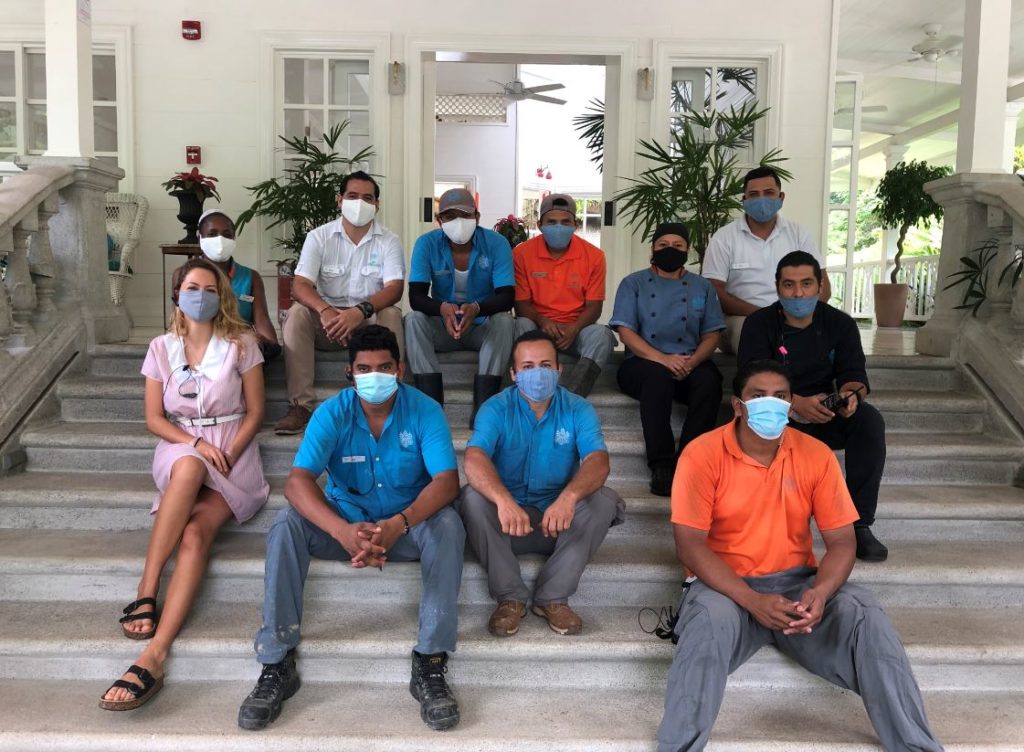The answer is a definite…. maybe.
Just as in so many things, there is no black and white here. I have heard many tourism and sustainability experts on online panels predict that sustainability will play a mayor important role in travel and tourism after the pandemic.
Honestly, I am not so sure – although, of course I would love to see that happen. What I have observed in the past months is that this Pandemic has certainly accelerated already existing trends (i.e. Online Shopping, Zoom Meetings and Virtual Learning) and so most likely there will also be some kind of impact in terms of sustainable travel.

So let’s talk for a moment about the new “buzzword” in sustainable tourism called “Regenerative Travel”. It received a lot of attention recently after Elaine Glusac mentioned it in her New York Times article called:
Move Over, Sustainable Travel. Regenerative Travel Has Arrived. Can a post-vaccine return to travel be smarter and greener than it was before March 2020? Some in the tourism industry are betting on it.
“If sustainable tourism, which aims to counterbalance the social and environmental impacts associated with travel, was the aspirational outer limit of ecotourism before the pandemic, the new frontier is “regenerative travel,” or leaving a place better than you found it.”
At Cayuga, we absolutely love the concept of a kind of tourism that “leaves a place better than you found it after vacationing there”. We intrinsically always had that goal since we first got involved in sustainable tourism (back then we called it mostly ecotourism) in the 1990s in Costa Rica. We can’t really imagine doing tourism any other way. Focusing on education, buying and hiring locally, creating opportunities for professional and personal growth for locals, and regenerating natural habitats has been on our daily agenda for over 20 years.

Throughout the years we also came across other terms such as nature-based tourism, geo-tourism, agrotourism, green tourism, aspirational tourism, wellness tourism, conscious tourism, fair trade tourism, impact tourism, ethical tourism, meaningful travel, travel philanthropy, and many more. But no matter how you spin it, it is most important to make sure that you walk the talk and really have a positive impact on the local people and the natural environment where you operate.
And that takes us back to the question of how things will evolve after the Pandemic. Will there be indulgent “revenge travel” with no real consideration of the environment and local people just because people believe that after suffering so much, they totally “deserve it”? Or will people tread more lightly and be considerate after having gone through those difficult times and having created more of an appreciation for nature and humanity? Maybe one hint lies in what happened in the roaring 1920s after the last Pandemic of 1918/19. Who knows? It is too early to tell. Let’s review this in early 2022.

Since there is no crystal ball and predicting the future, at the Cayuga Collection, we decided that we would just continue to focus on what is in our control and be true to our mission of finding the perfect symbiosis of sustainability and luxury in hospitality. We continue to proudly buy local, employ local, and run programs to help our communities and protect the natural environment around us.
As mentioned earlier, the Pandemic seems to act as an accelerator – and not necessarily change the way people think. So we believe that for the people (businesses and travelers alike) that were already on the sustainable travel path, they will continue their journey at higher speed and intensity and become more sustainable or regenerative. They will be more committed than ever to take conscious travel decisions and improve the places they visit through their travel contribution.

But others, that just adopted sustainability as a necessary evil to keep up with competitors or it was in fashion to stay at an ecolodge, might just drop their efforts for good and go happily back to the old ways of reckless consumption. As a sustainability gauge, check your local coffee shop, supermarket, a favorite restaurant, or hotel chain and see how much of their “no plastic” pledge of 2018 is still in place.
If you plan to visit us at the Cayuga Collection Hotels and Lodges in Costa Rica, Nicaragua, and Panama, we would be happy to take you on our complimentary back of house sustainability tour and show you what we continue to do in terms of sustainable hospitality practices and also bring you up to speed on what is new and changing.
You will be pleased to see that we have not brought any single-use plastics back and have developed solid sanitary and health protocols that do not only keep our guests and employees safe but also don’t produce a negative impact on the environment. We have been able to purchase even more locally and continue to focus our efforts on our staff and the local communities where we operate.



13 Responses
While we have to remain very careful in the future, I think that travel will be a huge part of people’s lives, of course this assumes that one day they will have the resources to afford it. I am sure that there are many levels of travel, from the ” let’s get away and have a riot” to ” the history of that place is amazing, lets see if we can find it”.
My wife and I are of an age where we can travel and want to enjoy the world, but ensure that the countries we visit actually benefit from the money we’re spending, not some affluent company in a distant country. This is the reason that groups like ‘Cayuga’ were exactly what we were looking for. I think that people will think more about “sustainability ” will figure more in the Holiday thought process.
We have been trying to organise a trip to our very favourite Costa Rica, but all to no avail. We won’t break any rules or try and sneak in the back door to get there. So! Roll on the time when we can meet all the Cayuga guys and enjoy the fantastic people, flora and fauna of your beautiful hotels and lodges.
See you soon.
Jim and Gina Palmer
Thank you Jim and Gina for your wonderful comment. No rush. We are here for you. Ready when the time is right. Saluods.
The Best Way to Predict the Future of Travel is to Create It.
When it comes to the travel industry, there will be no recovery. There will be evolution.
Things will never be as they were.
As Charles Darwin said, the fittest win out at the expense of their rivals because they succeed in adapting themselves best to their environment. This, then, is our Galapagos, an inflection point for adaptation in the travel sphere.
The global pandemic has beaten and bloodied few sectors as hard as travel. The numbers are gory: up to 75.2 million jobs lost worldwide in 2020. China, where the virus originated but was relatively quickly brought under control, may shed 25.6 million jobs. And in Italy, the European country hit earliest and hardest by the virus, may be responsible for the loss of one million travel-related jobs. The outlook in the U.S. and other parts of the world is murkier, where reignition has been a story of fits and starts, premature re-openings and the imposition of new shutdowns. The job body count is high, and growing still.
Nonetheless, it’s never too early to think about how we adapt once we get back on our feet, and into trains, planes, cruises, museums and events. Looking for the upside is not to downplay the crisis (we’ve seen what that produces), but an attempt to come to terms with the new reality. And to advance the good narrative when forward motion is imminent. Indeed, the pause forced on the travel industry may jump start a post-pandemic navigation of the world that will benefit a range of destinations and tourist locales, including those where locals and tourism authorities alike have been distressed by “overtourism.” We may find new motivation in a “regenerative travel” that is sustainability on steroids — not just minimizing harm but undoing damage that’s already been done. And in moving forward let us look to direct visitation and foreign exchange to places that need it more than the familiar first and second rounds of the “less-visited” and “hidden gems” integral to adventure travel for a generation.
While the tech sector has achieved in months what might have taken years, travel, being entirely dependent on our actual being in the world, not in a zoom room or a travel simulator, is where the existential, experiential reality of compulsive travelers, as many of us are, takes shape. There is just no substitute for the sense of place travel evokes, nor for our actual presence in these places, immersing ourselves in the landscapes and cultures that captivate our imaginations, spark our spirits and enrich our lives. For while tech has accommodated working remotely, travel can’t be phoned in. Which is precisely why we love — and need — it.
The irreplaceable and regenerative gift of travel is emerging first in domestic adventures, hiking, biking and rafting trips accessible without the plane ride. I confess I took several this summer, hiking in Arizona and Yosemite, trundling by sleeper car on Amtrak from Los Angeles to Seattle, and kayaking and rafting in the Pacific Northwest, discovering that we love where we live. If we ever took our own backyards for granted, we may never again. The pent-up demand to undertake mindful wanderings, far and near, is even greater now than after 9/11.
It’s time to seed the ground not just for a safe tourism evolution, but for a new awareness and understanding of travel.
Just as nothing can take the place of the person-to-person, face-to-face interactions that define our lives in the real world, there is no substitute for the can’t-be-commodified essence that animates the transformative nature of travel; the two (social interaction and travel) overlapping as we venture out into the world — into new spaces, foods, cultural discoveries and living contacts that broaden the mind— for the adventure of wonder that travel is. A broad, reality- based tourism reimagining may take us further beyond the passive sightseeing the industry began to eclipse with more adventurous offerings as far back as small ship expedition cruising that made landings by zodiacs where no port facilities existed. The next incarnation of this is well on the way — and established destinations will find new tours and modalities that open their cultural treasures and overlooked riches in ways that were in sleep mode before the pandemic.
So, here’s an odd paradox that epitomizes the moment we’re in.
Social media connects us but when indulged in excess can actually heighten our sense of isolation. Travel is one of the great antidotes to isolation and seclusion. It opens us and societies up, transports and beams us aboard an almost out-of-body experience in ways posting on FB and Twitter never will. That’s not to say the online community is not real. Or lacking in inspiration and influence. Quite the opposite, when the two go hand in hand. When it’s not one or the other but a pendulum swing that offers the fresh balance and perspective of both. That contributes greatly to our own and to society’s health and wellness.
So now and as the pandemic is brought more fully under control, our embracing of once-distant horizons counts. Not being flat-footed. One of the most nimble, compelling tools for destination marketing organizations (DMOs) and their partners may be the kind of authentic, granular, up close and personal storytelling enabled by social media platforms, allowing travel influencers to share their personal experiences with audiences they’ve cultivated, not paid for — and in being intrepid (not reckless) explorers of the new normal, using text, photos, videos and music, their tales of “the new world ” may trigger insights into how suppliers, airlines, accommodations, tour operators and tourism boards, are actually enacting the comprehensive protocols, the launching of new tours and experiential frameworks (involving “physical distancing” in families or friends in small groups, not “social distancing,” which seems psychologically aloof), that will pave the way to a tourism evolution that works. These will be stories shared by an advance guard of social media influencers exploring tourism’s terra incognita, putting pins in the new map.
Stories from the front lines of well-timed and managed re-openings, unfolding around the world in real time, told with candor and credibility, may accelerate the early days of a robust tourism dynamic — facilitating an early step before a reshaping that depends on the arrival of a safe and effective vaccine. While ultimate timing and outcomes are not yet known, the trailblazing of solutions is in the works. We can be prepared for this horizon — on our toes, ready to open novel doors. As we go out and redefine how we experience the world — with our senses re-attuned, our situational awareness re-engaged — perhaps as never before. Let it bring awakenings and inventions — the way we travelers and suppliers have always risen to the greatest challenges. For like tech and tech in travel, the travel industry is nothing if not avid to pioneer, and primed to evolve to a higher kind of wandering star.
http://www.steller.co
http://www.mtsobek.com
https://www.responsibletravel.org/
Thanks Richard. This is not just a comment, this deserves its own blog. I love the “travel can’t be phoned in” quote. So true. We look forward to having you and Laura with us soon in Costa Rica, Nicaragua or Panama. We are ready. Pura vida.
You cannot be a healthy business in an unhealthy economy on an unhealthy planet and I think people are becoming more aware of this, whether it’s in those words or not. COVID has brought a level of fragility to travel that the average consumer never thought about before. I hope that because of having this freedom taken away temporarily from people, they will return to travel more conscious about their impacts and where their money is being spent. Like you, I’m not 100% convinced that tourism is going to return monumentally more sustainable than it was before, but we can at least try to have this impact. I truly believe though, that this was a good reset for many people and it won’t be a return to parties on the beaches, overcrowded destinations, and polluting cruise ships. It’ll be a subtle return to travel in more conscious awareness and with a connection to nature that many didn’t realize they needed until a lockdown.
Thank you Jonny. I think a lot of people realized the value of unspoiled nature for all of us. We will see how that plays out in terms of tourism in the next months.
Enjoyed this thank you and i agree the crystal ball continues to be anything but clear and wishful thinking abounds. Nevertheless we applaud the Cayuga Collection, your ethos and commitment, and at Senderos all we can say for sure is that our obsession with the sweet point where tourism meets conservation, scientific research and true sustainability remains undimmed – in fact it is only stronger after this most challenging of years. We are 100% committed to sharing the positive stories of the vanguard, it’s what we love, and more and more yes that will be true regenerative tourism. Abrazos!
Thank you Simon. Let’s continue to share those positive stories to inspire others to follow.
Thank you Hans for your reflective appraisal. The word ” sustainability” is so broad a term and means so much, I like to keep things simple, because I believe if you do that ,more will and can be achieved. Expressions related to “sustainability” such as your long list from “eco tourism ” to ” regenerative tourism” are in my view alternative marketing terms that mean nothing unless they are delivering the core you outlined- benefiting locals and benefiting the environment and creating a positive impact. It is that simple. Different environments require different solutions and some solutions are complex but the strategy is the same.
For me I wrap all this up in one word that applies to travellers and the travel industry together which I learnt right at the outset of my ” sustainability journey” and commitment over 30 years ago.
I refer to it as ” Responsible Tourism” . No matter who we are and where we are in the travel journey we can each take our responsibilities to the planet, its places and its people with a perspective that we should do no harm. For me ” Responsible Tourism” is a SIMPLE UMBRELLA term that defines our goals and purpose be it at an individual, corporate, social enterprise or a government level.
In terms of what the future holds, well it lies in all our hands as individual travellers, governments and travel and tourism operators. I think the specialists will always strive in the main to do the right thing. The online booking agencies have much further to go. But they too can do a lot and its consumer demand that will force them to start to act more responsibly.
The growth of populism and its seemingly destructive regard for institutions that hold insight and knowledge is indeed a threat because if generally responds best to emotional often less informed instinctive behaviours and is a potential threat to the desire for a more “responsible” world. The USA abandoning of the Paris Climate Accord is a prime example of an ill-informed populist strategy. But I remain a believer in the fact that from small acorns grow oak trees and to mobilise populations with better understanding and insight, can mobilise changing behaviours. It’s about letting people see the world is better for responsible tourism strategies, not worse, and that everyone plays their part and should be proud of their contribution. So continuing education and insight is key, keep it simple for ordinary people like you and me to understand and implement, and that way everyone can play a positive part and then collectively we can contribute to a “regenerated” world. “We have to realise that by embracing sustainability we can create change. Change takes time and we each can’t do everything but we can all do something” Fiona Jeffery OBE
Thanks for this very thoughtful comment. Right on. It is not about wording, marketing, or buzz. It is about exactly what you say. Embracing Sustainability to create Change. Please come visit us soon so that we discuss this further over a cold beer at the beach. Happy New Year.
Pandemic has changed a lot across the globe and has changed the way people think now. Feels like we have accepted and learned to live in this tough Pandemic situation. On other hand, Revenge travel is an Opportunity for the Hospitality and Travel Industry to Heal itself from the Pandemic wound. Travelers are more confident and they have their valid reasons for it and ready to travel now.
Thank you so much for such a wonderful and educational blog. I enjoyed reading it and learning from it. Keep up the good work.
Thank you Liam for this nice comment.